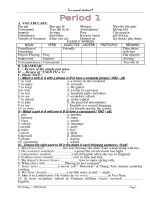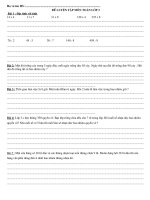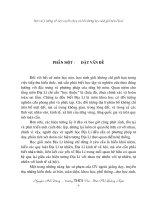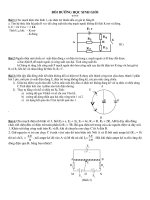pretest 20 boi duong hs gioi 9 – tngdpt tay ninh 1 pretest 13 i use the verb in parentheses in their correct tense forms 1 mr brown who 1 come from california 2 work in this company since he 3
Bạn đang xem bản rút gọn của tài liệu. Xem và tải ngay bản đầy đủ của tài liệu tại đây (122.31 KB, 4 trang )
<span class='text_page_counter'>(1)</span><div class='page_container' data-page=1>
<b>PRETEST 13</b>
<b>I. Use the verb in parentheses in their correct tense forms:</b>
<b> 1. </b>Mr. Brown, who (1.come) from California, (2.work) in this company since he (3. move) to this
city ten years ago. He thinks that he (4.get) a pension when he (5.retire) in 2010. By that time he (6.
work) for the company for 21 years. He (7.return) to California after (8.retire).
2. It (1.be)a long time since I saw Nam. So when I (2.see).him in town yesterday, I
(3.be)quite surprised. He (4.change)a lot and (5. g r o w ) m u c h m o r e h a n d s o m e
<b> </b>
<b>II. Read the passage and choose the best answer:</b>
<b> Most educational specialists believe that early schooling should provide children</b>
with an awareness of their own abilities and the self-confidence to use their abilities. One
approach recognised by many experts as promoting these qualities is the
Montessori-method, first practised by Maria Montessori of Italy in the early 1900s. Nancy McCormick
Rambusch is credited with popularising the method in the United States, where today there are
over 400 Montessori schools.
The method helps children learn for themselves by providing them with instructional
materials and tasks that facilitate acts of discovery and manipulation. Through such exploration,
children develop their sense of touch and learn how to do everyday tasks without adult
assistance. Other benefits include improvement in language skills, and acquaintance with elements
of science, music, and art.
1. What is the main purpose of this passage?
A To explain the role of early education in child development.
B. To describe the development of the Montessori method.
C. To discuss the life and work of Maria Montessori.
D. To demonstrate how children learn social and cultural values.
2. According to the passage, who was first responsible for spreading the Montessori method
in the United States?
A Nancy McCormick Rambusch. B prominent educational expert.
C Maria Montessori. D. An administrator in the Department of Education.
3. Which of the following 3is not mentioned as a benefit of the Montessori method?
A Development of tactile senses. B. Improvement of language ability.
C Capacity to perform adult tasks D. Knowledge of arts and sciences.
4. The author of this passage probably feels that the Montessori method
A has little long-lasting benefit for children.
B. will lose its popularity in the United States.
C does not accomplish what it claims to achieve.
D. is an effective means of child education.
5. The following paragraph most likely discusses:
</div>
<span class='text_page_counter'>(2)</span><div class='page_container' data-page=2>
C. additional practitioners of the Montessori method.
D. elements of science, music and art.
<b>III. </b><i><b> You are going to read a newspaper article about children's safety. Choose the most suitable heading </b></i>
<i><b>from the list (A-1) for each part (1-7) of the article. There is one extra heading which you do not need to use. </b></i>
<i><b>There is an example at the beginning (0).</b></i>
A. Dangers off the road too B. Trial period C. Not what it appears to be
D. Dangerous driving E. Dangers of fuel F. First of many?
<b> G. Learning to judge H. Funds from industry I. Danger in the city (0)</b>
1. It is a typical urban scene. Two cars are parked close together at the kerbside and a child is
attempting to cross the road from between them. Down the street, another car looms. Houses
flank the pavements and around the corner there is a brightly-lit petrol station.
1. It is all extraordinarily realistic, but it is unreal. For the difference between this
and thousands of similar locations throughout the country is that this street is indoors - it is
a mock-up designed by studio set-builders from Anglia Television.
2. We are standing inside a converted warehouse in Milton Keynes, home of a project which is
the blueprint for an exciting new way of teaching children safety awareness, especially
road safety. It is called Hazard Alley. If the centre proves successful and, having visited
<i>it, I am convinced it will, then its imaginative approach could easily be copied </i>throughout the
country.
3. The project was started by the local authority in conjunction with the police. The
finance came from commercial sponsorship by companies inclu ding Coca-Cola,
Volkswagen and Anglia TV. There is already a catchy cartoon character mascot the centre:
Haza, the Hazard Alley cat.
4. A novel setting for children to be taught and practise a wide range of safety topics,
Hazard Alley takes its name from the dark alleyway in the centre of the converted
warehouse which links the urban street scene and a series of country sets that focus on
rural safety. As well as road drill, children are tutored in home safety and how to
avoid trouble in playgrounds, parks, alleyways, near railways and on farmland.
5. In the street scene, children practise the safe way to cross a road, including coping
with parked vehicles, and are given a practical understanding of how long it takes a car
to stop when travelling at 30 mph. Could the car they see looming down the road stop in
time if a child stepped out between the parked cars'? No, it would be through that wall
at the end before it finished braking, 23 metres after the driver started to brake.
6. On the mock-up petrol station forecourt, provided by Shell, the youngsters learn the
dangers when filling a vehicle with petrol. They discuss car fires, the flammability of
different components, why the car's engine must be switched off and why smoking
and using a car phone are illegal on a garage forecourt.
</div>
<span class='text_page_counter'>(3)</span><div class='page_container' data-page=3>
open to individual family groups. When that happens, it will be well worth a day trip:
children will love it and they could learn something which may save their lives.
<b>IV. Use correct forms of the words in parentheses:</b>
<i><b> At first light, there is nothing (0)unusual about the town of Cameron Park In</b></i>
California but, as the day begins and the town comes to (1. LIVE), you can't help
(2.NOTICE) that, among the cars, there are light aero-planes moving along the roads
towards the airport.
<b> When the town was (3.ORIGIN) built, a small airport was included for the</b>
<b>[4.CONVINIENT] of people flying in to look at the properties which were for [5.SELL] but it</b>
soon became clear to the developers that this was an attraction in itself. The streets
<b>were (6.WIDE)so that plane could use them, the mailboxes near the road were made</b>
(7.SHORT)to avoid passing wings, and all the electricity cables were buried (8.GROUND).
<b> Now, there is every (9.LIKELY) that the residents will have a private plane in</b>
<b>their garage and use it with the same (10.FREE) other people enjoy with their cars.</b>
<b>V. Fill in each blank with one suitable word:</b>
<b> 1. Air pollution can make people ill. Consequently, some countries pass a law to control the</b>
quantity of smoke (1)... the air. Air pollution causes particular damage (2)... the body by
harming the lungs. Lead should not (3)...used in petrol because it is bad for children's
health and makes them clumsy in using (4)...hands. Pollution can also have an influence on the
earth's climate. The (5)...may melt near the North and ...(6)... Poles, resulting in very bad
floods.
2. Satish has just left school. Next year he is going to travel. He says "I want to get some
experience of life (7)... . I start studying." He is going to spend six months in South
America (8)... six months in the Far East. First of all he is going to get a job(9)...a factory in
Brasilia - his father has got usiness contacts there. When he (10)... to the Far East he is
going to try to find a work of teaching English.
<b>VI. Rewrite the following sentences:</b>
1. I didn't realise he was your brother until I saw photograph.
<i>It was only...</i>
2. The Prime Minister is the statesman I admire most of all.
<i>There is...</i>
3. I never intended to go to the meeting.
<i>I never had...</i>
4. I am absolutely sure they weren't travelling in such bad weather.
<i>They can't ...</i>
5. Many people were severely critical of the proposals for the new motorway.
<i>There was ...</i>
</div>
<span class='text_page_counter'>(4)</span><div class='page_container' data-page=4>
<i>For such...</i>
7.The only way to eliminate world terrorism is by united opposition.
<i>Only by ...</i>
8.He forgot about the gun until he got home.
<i>Not until ...</i>
9. It’s time you went to the meeting.
<i>I wished...</i>
10. I’m sorry for not telling you about that.
<i>I wish...</i>
<b> VII. Write complete sentences from words/phrases given:</b>
Dear Stephanie,
1. I write / tell you / discussion / I have / father last weekend.
...
2. We talk / several hours, / and I tell / all the plan / we make / our business.
...
3. At first, he / not interested / and say / we be not old / run a business.
...
4. However, I tell him / we already see the bank manager / who say the plan be realistic.
...
5. So then he sit down / and ask me tell / how much money / we need / start with.
...
6. And where / we sell the stuff / we make, and so on.
...
7. Eventually, he tell me / inform you / he lend us / some money / get started.
...
8. Honestly, I/ not believe / he say it!
...
9. We meet next week / discuss / how / get things going?
...
10.I really look / see you again.
</div>
<!--links-->









